Permalink
I found the "Maslow's Hierachy of Needs" chart (below) in Tim King's article
http://www.salem-news.com/articles/december032009/afghan_tk.php on the Afghan War very insightful and enlightening.
The chart was enlightening for me because it identified the various levels of my needs for existence that my ex husband, his attorneys, pseudo Christian friends and the courts sought to destroy these past 14 years after I sought safety from domestic violence.
It has been a difficult journey in building an existence when you are constantly under attack and siege. No wonder so many women choose not to "stay" in domestic violence situations. Often the alternative is a full fledge war on their being. Oprah and many counselors who recommend seeking safety from DV do not have a clue.
- Coral
Afghanistan and Obama's Point of No Return
Tim King Salem-News.comTaking a Stand in Afghanistan, Obama rolls the dice to push a war against a land of determined people, who have never been defeated on their own soil. (Includes previously unreleased Afghan video.)
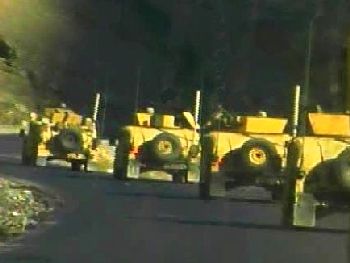
Americans on the move in the Afghan Countryside.
All Afghanistan photos by Tim King unless otherwise noted.
(SALEM, Ore.) - President Obama's decision to push on in Afghanistan will be remembered as a point of no return for this war. The forces that our military will increasingly engage are well armed and they are smart. It isn't going to be easy.
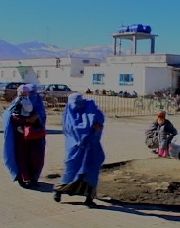
I left Afghanistan with many impressions after spending the winter of 2006/2007 there. I used the opportunity to study the military operation and the people engaging the Coalition in combat. I left Afghanistan with a great impression of its hearty people.
I saw the killing tree at Jalalabad, where Usama bin Laden is said to have trained al Queda soldiers. I went into the prison where I was told so many Afghan people were held and executed. These were people who resisted a radical militant agenda.
It is easy for western people to forget that most Afghans are just family people trying to survive "day by day" as the occasional English-speaking Afghan often tends to say when describing their difficult life.
My friend Mattiulah worked as an interpreter or "terp" for U.S. forces. He shared horrible stories about the Taliban; he said they decapitated his brotherwith a knife, leaving behind his five children as orphans. And then a group of them drove by his house in a pick-up truck and shot and killed his two-year old daughter. Then his mom died of a broken heart.
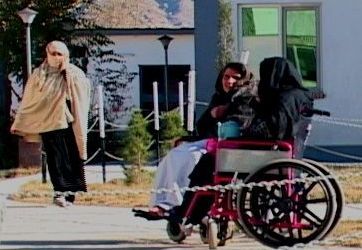
I met women who had been relegated to wheelchairs by bombs they said the Taliban specifically set. I interviewed a ten-year old boy in Kabul, who told me he appreciated the Americans because, "They kill the Taliban and help bring peace and prosperity to our nation."
Personally, for what it is worth, I think the Taliban were nothing more than thugs operating a totalitarian regime using religion as an excuse. It is not a theory that they treat or have treated women in ways that even hardened people in relatively normal societies would never tolerate. But that begs the question, what isa normal society?
I was working on a film project in California a few weeks ago, when the news flashed a story about an American high school girl who was gang raped at a high school dance while people simply walked by, ignoring her cries for help.
My colleague Dexter Phoenix watched a man in Spain beat a young woman in a city street, with a motorcycle crash helmet. A crowd gathered to watch and a police officer monitoring the incident blocked Dexter from intervening, indicating that it was not his business. This is shocking, this is the western world we're talking about, Spain, and the couple was local.
As much as I despise the acts of the Taliban, I wonder what could have been accomplished if we tried to bring about peace without simply increasing our military might. I guess we'll never know. I do know that President Obama can talk about how we're not an occupying force until he's blue in the face, and he will never be right. In the eyes of the Afghan people, particularly those who oppose NATO for whatever particular reason, it is nothing but another occupational military force.
Reality of Afghanistan
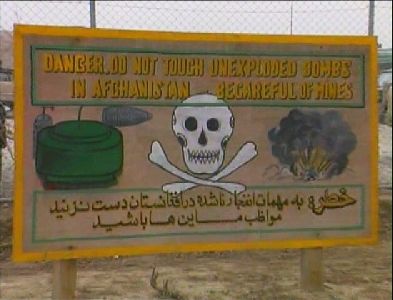
So what are the answers? I am not sure. I receive a lot of email from parents of mostly Marines, but other services also. Sometimes it is a bit unnerving. They find my reports from Afghanistan and Iraq and they write to ask if I am going back, and if so they want to know if I can go where their kids are so they can learn more about what is going on.
There is a sad lack of reporting from this place and it makes no sense.
As a result of its violent past, Afghanistan has more land mines than any other country in the world. There are mountains everywhere you turn, with steep and difficult terrain that is tough to negotiate.
The history of Afghanistan is tribal, and there are several distinct cultural groups who live here. There are historic rivalries and difficulties and borders that have been redrawn by western nations have not helped to keep the peace.
When I was there aircraft were in short supply, and we drove roads that made the people I traveled with very uncomfortable. They talked openly about the lack of air transport and the risks it brought.
The risks are shared by all here, and the lack of any sound financial infrastructure keeps the situation tense. Poor and hungry people do not operate with any degree of normality, as referenced above. As long as they wonder where their next meal is coming from, they are dangerous and not very trustworthy.
Never released video from Kabul Afghanistan: interviews with Afghan cops
Glaring points that stood out clearly when I was in country included the lack of pay for the Afghan National Police, and the Afghan National Army.
The anti-Coalition militias pay more, that is a real problem. Bringing Afghanistan forward will require a great deal of cash and support. Their police should have bullet proof vests, they should receive winter clothing, the list goes on and on.
I produced a brand new report that shows the entire interview that I conducted with two Afghan National Police officers in Kabul in December 2006. How much things have changed, I can not say for sure. The price of flour for example has skyrocketed since these interviews. The ANP as they are generally known, were making roughly $70 a month when I spoke to them.
These officers talk about how their particular police station is supposed to be be staffed by 35 people, but they only have 10. They asked me repeatedly if I would give them my gloves.
The way the Afghan police live is only one example of how the disparity of this country and the way it breeds political instability.
I have written before about how President George W. Bush started and then soon killed, theAfghan Children's Fund. As I witnessed the appalling conditions that Afghan children lived under, I could scarcely believe that my country was there, and that things were still so bad for these people. I think they are a bit worse today, all these years later.
Maslow's hierarchy of needs
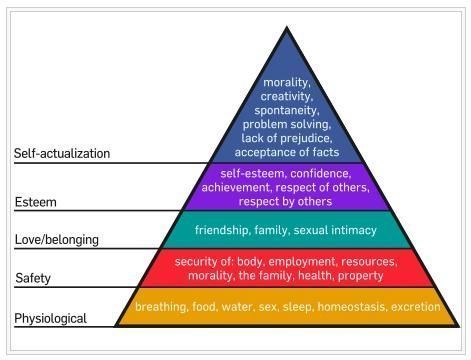
An interpretation of Maslow's hierarchy of needs, represented as a pyramid with
the more basic needs at the bottom Courtesy: Wikipedia
Many psychology students are familiar with Abraham Maslow'shierarchy of needs; it is a theory of psychology that Maslow proposed in his 1943 paper, A Theory of Human Motivation.
Wikipedia describes Maslow's hierarchy of needs as a pyramid consisting of five levels:
The lowest level is associated with physiological needs, while the uppermost level is associated with self-actualization needs, particularly those related to identity and purpose. The higher needs in this hierarchy only come into focus when the lower needs in the pyramid are met. Once an individual has moved upwards to the next level, needs in the lower level will no longer be prioritized. If a lower set of needs is no longer be met, the individual will temporarily re-prioritize those needs by focusing attention on the unfulfilled needs, but will not permanently regress to the lower level. For instance, a businessman at the esteem level who is diagnosed with cancer will spend a great deal of time concentrating on his health (physiological needs), but will continue to value his work performance (esteem needs) and will likely return to work during periods of remission.
Afghanistan's people, with few exceptions, have had little opportunity to rebuild a sound life and culture. Some have money but most have next to nothing.
Until the basic needs of these people are met, their futures are dismal at best. One out of five children won't make it until the age of five.
I was told by local people that the average there is somewhere in the 40's. WikiAnswers states that "The Life expectancy in Afghanistan is about 45 for a female and 46 for a male."
Winning Afghan Hearts and Minds report by Tim King
But our military isn't authorized to treat Afghan citizens with any real degree of frequency. I attended a MEDCAP mission and spent several hours watching military medical teams from three western countries treat 399 of these unfortunate people. They couldn't do much for most, but bottles of Tylenol and baby formula were regarded as though they were gold.
Women desperately pushed and competed for a better place in line with one another, all believing that they would miss their opportunity to see a real western doctor.
I was told by both American and British doctors in Kabul that simple medical care could do wonders for the people there. Doctor Harry Ward of Los Angeles California, said that day, that the most basic care on a regular basis would do wonders. "Many of them be helped with just preventive care and regular care, and regular doctor medical care and definitely with a new health system here, I think this could be turned around."
Again, the soldiers, doctors and nurses, the people on the ground, do everything they possibly can, but their hands are tied, as are the national wallets. The money that funded the MEDCAP was charity, and the military groups only donated the people, as if that is a small matter. The rules still need to change and money should be allotted for regular medical treatment of Afghan civilians.
They are grateful for anything positive they can receive from our presence there, and there needs to be a lot more. We can only depend on people who are fed, to cover our back and show courage in the face of an enemy like the Taliban.
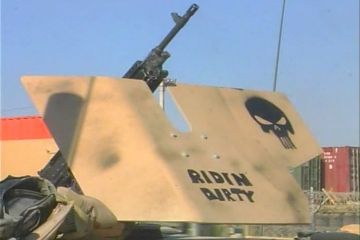
I soon began seeing this lack of commitment in the spirit of the mission everywhere I turned. It wasn't a lack of spirit from the U.S. forces, but from much higher above. Of course then everyone in Afghanistan believed they were fighting a forgotten war. Many told me they were totally shocked to see a reporter and a camera from the states. I soon got used to it.
While new people are always going to war for the first time, a large number of the Americans serving in Afghanistan have already seen too much war. They become impatient with the local people and sometimes become reckless. It isn't necessarily their fault; war takes a toll on a person's psyche.
Too much of anything I have always been told, is a bad idea. I don't see how repeated combat tours are any different, or the war in Afghanistan as a general concept for that matter. Any examination of history shows that long lasting wars are demoralizing. I sure hope Obama has a plan that goes beyond simply killing all of the people who oppose our occupational force, on their own land. I don't think he does.
We now know how things will go and a lot more Americans will go to Afghanistan to wage war with the Taliban and al Queda, groups who increasingly referring to themselves as the Mujaheddin in an apparent PR stunt, and comparing themselves to the fighters who freed this remote country from a Soviet occupation during the 1980's. Reporters are jumping on board with the language too, and some are seriously downplaying the Taliban's past, and that is sort of like glamorizing the Nazi's, in its own way.
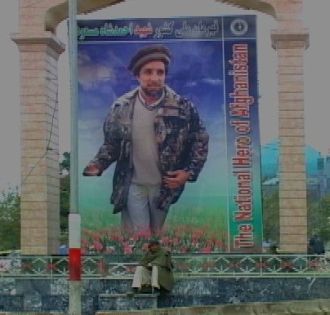
Afghan Hero Ahmad Massoud was the "Lion of Panjshir"
Articles now are increasingly referring to the Taliban as "Mujaheddin" and while elements of today's Taliban and al Queda obviously did participate in the defeat of the Soviet occupation in the 1980's, thus belonging to the group commonly called Mujaheddin, we are talking about unique groups, of which there were many.
The real hero of Afghanistan is no Taliban or al Queda leader, it is Ahmad Shah Massoud, who was killed on September 9th 2001, two days before the attack on the United States.
He was a Kabul University engineering student and the son of a police commander, who as a military leader was a large operator in the defeat and ousting of the Soviet army in 1989. An ethnic Tajik, he became known as the "Lion of Panjshir" and his face is posted on everything in Afghanistan from billboards and buildings, to the back of "jingle trucks" moving down the country's highways.
He was a leader in the "Northern Alliance" as it became known, and one of many leaders in this country who wrestled with political control while trying to bring a moderate type of government to his people.
Massoud ascended up the political ladder, and was the Afghan government's Defense Minister when he finally ordered a retreat from Kabul on September 26, 1996. He had little choice, as Taliban forces had encircled the capital.
It is a popular belief in Afghanistan and beyond, that bin Laden ordered Massoud's assassination, two days before the September 11, 2001 attacks on the United States, on behalf of the Taliban, who served essentially as al Queda's protectors.
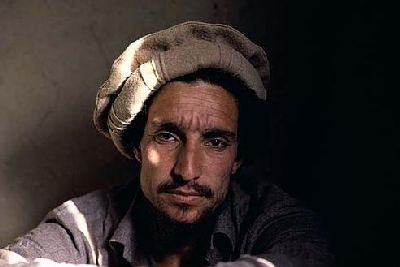
The Lion of Panjshir, the most brilliant and best educated (militarily)
of the mujahideen, fiercely independent of even the CIA and ISI, murdered
by Osama bin Laden on September 9, 2001. Photo: farm1.static.flickr.com
His death ensured that bin Laden would have the Taliban's protection and co-operation in Afghanistan. The assassins posed as a TV news team from Belgium, and it is reported that they offered words of support for bin Laden while questioning Massoud, before killing him with a TV camera rigged as a bomb.
Ahmad Massoud, the "Lion of Panjshir", was the kind of leadership figure Afghanistan needed, but this violent place lacked the security to usher him into a better position. The Taliban and al Queda opposed this man and those who sympathize with these groups do his legacy a great injustice.
I am not happy that we are sending 30,000 more people into Afghanistan, I am worried on their behalf, and I am worried about the collateral damage and the way that turns more people against our forces and their mission.
On that note, I am bothered by the Americans who blame the Afghan people at large; that is cruel and possibly evil, especially when you consider the wretched lives of these human beings who for the most part, couldn't even point to the United States on a map.
The U.S. military and its allies will perform this mission and either be successful, and prevail, or it will become a conflict that goes on for years and years, demanding American taxpayer resources and claiming more and more lives. It is a place where all previous invading armies have been repelled. I hope it is worth it.
Resource articles:
One Billion Dollars Allowed Afghan Rebels to Defeat the Soviets
IED's Blamed in at Least Half of Latest Iraq and Afghanistan War Casualties
Unemployment & Low Pay in Afghanistan & Iraq Bolster Insurgency
U.S. Marines and an Afghanistan Ghost Town Called Now Zad
War Reporting and Propaganda in Iraq and Afghanistan
An Inside Look at the Helmand Province in Southwest Afghanistan
=================================================
 Tim King is a former U.S. Marine with twenty years of experience on the west coast as a television news producer, photojournalist, reporter and assignment editor. In addition to his role as a war correspondent, this Los Angeles native serves as Salem-News.com's Executive News Editor.
Tim King is a former U.S. Marine with twenty years of experience on the west coast as a television news producer, photojournalist, reporter and assignment editor. In addition to his role as a war correspondent, this Los Angeles native serves as Salem-News.com's Executive News Editor.
Tim spent the winter of 2006/07 covering the war in Afghanistan, and he was in Iraq over the summer of 2008, reporting from the war while embedded with both the U.S. Army and the Marines. Tim holds numerous awards for reporting, photography, writing and editing, including the Oregon AP Award for Spot News Photographer of the Year (2004), the first place Electronic Media Award in Spot News, Las Vegas, (1998), Oregon AP Cooperation Award (1991); and several other awards including the 2005 Red Cross Good Neighborhood Award for reporting. Serving the community in very real terms, Salem-News.com is the nation's only truly independent high traffic news Website, affiliated with Google News and several other major search engines and news aggregators.
You can send Tim an email at this address: newsroom@salem-news.com
Permalink



No comments:
Post a Comment